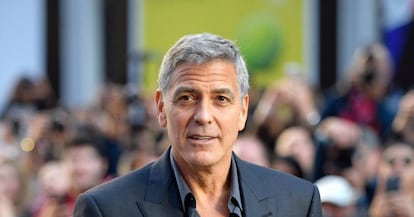George Clooney: “Racism is our unresolved original sin”
'Suburbicon,' a dark comedy about 1950s America, opens Friday at movie theaters across Spain

George Clooney’s very first film appearance lasted under 15 minutes. His character, Oliver, dreamed about being an actor but was ultimately murdered by the killer in the 1987 Return to Horror High. Before his onscreen death, however, he uttered a premonitory line:
-Are you gonna be a star, Oliver?, asked a girl in mocking tones.
-I’m gonna try, he replied.
One might safely say that he has managed it. The man who opens the door of the hotel room and greets this reporter warmly has become a global celebrity. At age 56, he’s got the world at his feet and a personal charm that is felt within seconds. He looks me in the eye, smiles and asks: “Can I get you something?” But instead of his world-famous coffee, Clooney pours out two glasses of water. He sits down and manages to make me feel right at home. It is as though this man, possibly the best-known actor on the planet, were an old acquaintance. Certainly, many aspects of his life are well known to the public: his movies, his social activism, the fact that he recently became a first-time father.
Fame is like light to insects. You fly to it because it is fascinating
If he is feeling tense, he does not show it. But a lot is at stake with Suburbicon, which had its world premiere in September in Venice – where this interview took place – and which opens Friday in Spain. His previous movie, Monument Men, was such a flop that he apologized to his financial backers, as leaked e-mails show. Clooney needs to dispel the question marks regarding his ability behind the camera, but the first reviews of Suburbicon do not seem to be helping much.
“In the space of a year my agent sent me 80 scripts of movies that I could direct. 80! Some big, some small, but none of them attractive. It was shocking,” he explains. In the end, Clooney merged two separate elements into one: an unfilmed script by the Coen brothers about a family with a penchant for murder, and the real story of the Myers as told in the 1957 documentary Crisis in Levittown, about a picture-perfect white residential community that discovers in horror that a black family has moved in. That very same afternoon, “there were 500 people in their yard, erecting fences to isolate them,” says Clooney.
Suburbicon has recreated a community that looks idyllic but where monsters lurk just beneath the surface. There are homicides, displays of racism, and a lot of dark humor. The movie talks about walls in the days of Eisenhower, “when it was believed that everything in America was great.” The parallel with today’s America is evident. So is the finger pointing at the White House.
The worst movies are those that appeal to the easiest audience
Clooney used to play basketball with Barack Obama, but he views Donald Trump as a racist. The actor mentions the May clashes in Charlottesville between white supremacists and people marching for rights for the black minority. Trump condemned both sides equally.
“A leader should never compare those who march for equality with the Ku Klux Klan. Racism is our unresolved original sin,” says Clooney, who feels that things have moved backwards since the days of the civil rights movements in the 1970s. “We have yet to exorcise the worst about the US.”
Asked if Suburbicon might help, Clooney replies that a movie cannot lead a movement. “But art can reflect where we used to be, what we used to think, what our fears were. That’s the kind of cinema I want, not just meaningless superhero movies.”
While noting that he has nothing against superhero movies – he tried his hand at it with Batman & Robin – Clooney says he prefers “brave” cinema.
A “ridiculous” father
In June, George Clooney’s wife Amal gave birth to twins. With his usual sense of humor, he declared that being a first-time father is “terrifying.”
“It’s ridiculous for me to be here, at 56, discussing fatherhood when I have 23-year-old friends who’ve had children,” he notes.
“It’s overwhelming to know that you’re responsible for two people,” he adds. “We have to try to ensure that our children, who were born into the most privileged of situations, will understand empathy and that it’s just luck that they live in a context that most people don’t have.”
“The worst movies are those that appeal to the easiest audience, without effort,” he says. “I understand that people don’t want to invest in something that is not designed to make huge box office earnings. I know that our industry is not like painting at home, you need millions. And I feel responsible to ensure the project will be what I said it would be. But I can’t guarantee that it will be a box office hit. I don’t try to make movies that will make money.”
Instead, Clooney tries to make the movies that he likes, with a reduced budget, his usual team and a cast made up of friends. In 2006, he became the first person in Oscar history to be nominated as an actor and director for two different movies, Syriana and Good Night, and Good Luck. But there have also been disappointments along the way. “I’ve had great successes and great failures,” he admits. Maybe that’s why he would rather focus on directing and screenwriting: “I am not going to act unless I find something really great. Besides, I’m too old to be the guy who gets the girl.”
Maybe so. In any case, Clooney continues to be worshiped wherever he goes. He cannot go unnoticed, no matter where he is on the planet. “You sign a deal with fame, but you don’t discover it until you’re there. It begins with the fact that nobody wants to hear you complain. I understand,” he says, recalling how he used to hear Elizabeth Taylor complaining about the horror of her own life when he was a young man, and thinking ‘Oh, shut up!’
“Fame is like light to insects. You fly to it because it is fascinating. You get there and then you say: ‘I’d love to be able to walk through Central Park with my wife and kids. Or sit at a sidewalk café. I miss that.”
English version by Susana Urra.
Tu suscripción se está usando en otro dispositivo
¿Quieres añadir otro usuario a tu suscripción?
Si continúas leyendo en este dispositivo, no se podrá leer en el otro.
FlechaTu suscripción se está usando en otro dispositivo y solo puedes acceder a EL PAÍS desde un dispositivo a la vez.
Si quieres compartir tu cuenta, cambia tu suscripción a la modalidad Premium, así podrás añadir otro usuario. Cada uno accederá con su propia cuenta de email, lo que os permitirá personalizar vuestra experiencia en EL PAÍS.
¿Tienes una suscripción de empresa? Accede aquí para contratar más cuentas.
En el caso de no saber quién está usando tu cuenta, te recomendamos cambiar tu contraseña aquí.
Si decides continuar compartiendo tu cuenta, este mensaje se mostrará en tu dispositivo y en el de la otra persona que está usando tu cuenta de forma indefinida, afectando a tu experiencia de lectura. Puedes consultar aquí los términos y condiciones de la suscripción digital.









































